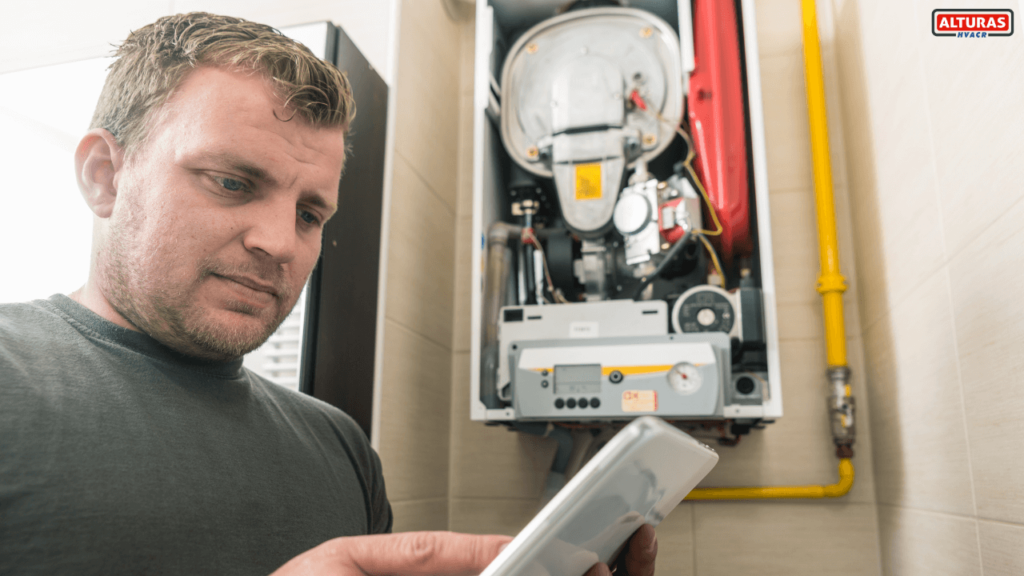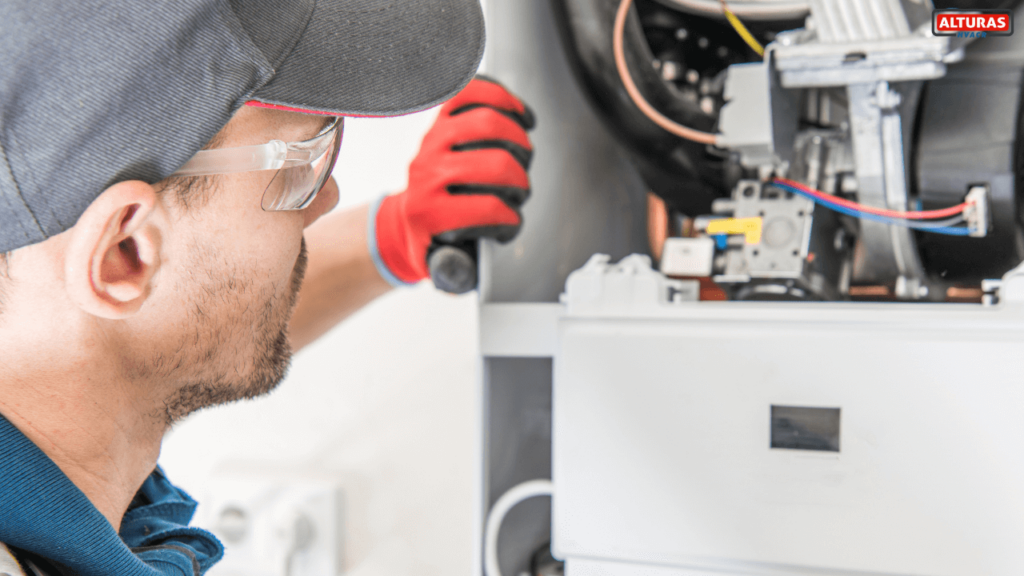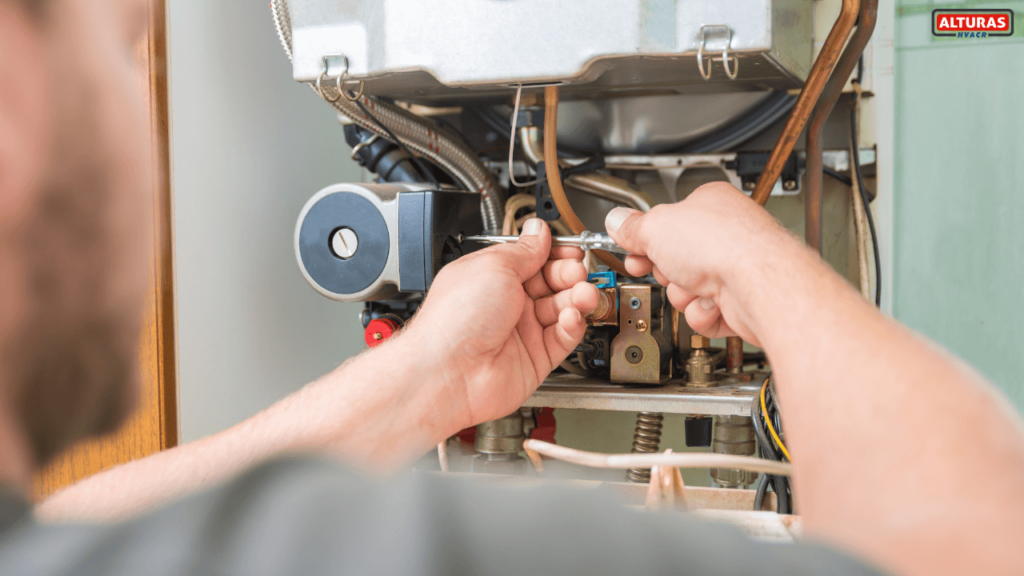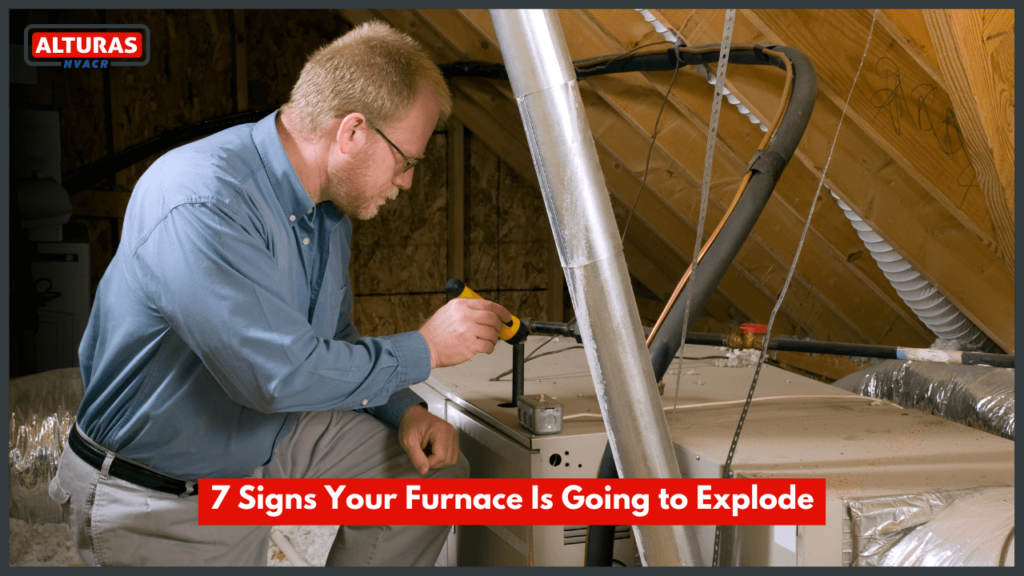When the temperature outside drops below freezing, a furnace can be a lifesaver inside the house. However, regular furnace maintenance is necessary when operating many furnaces. If you leave a problem with your furnace unfixed, it could explode.
To avoid any potential hazards, it is important to inspect the furnace regularly. In this article, we will discuss the safety measures you should take and highlight the top 9 signs that your furnace is going to explode.
Can A Furnace Explode?

Even though the safety standards in the majority of furnaces are high, an explosion can occur if you do not take proper care of them. The furnaces require maintenance off and on, especially in winter. Understanding when your furnace needs repairing will reduce the risk of any kind of explosion. We would recommend you to stay in contact with a heating installation or repair company.
9 Signs Your Furnace May Explode

Checking on your furnace often will help you identify issues on time. Even a minor problem can sometimes lead to an explosion. Here are the top signs that will indicate your furnace is going to explode:
Fuel Smell
One of the most common and easy signs is being able to smell fuel from your furnace when turned on. This is mainly due to any sort of leakage and it is highly flammable. Never try to resolve this issue on your own in such cases. Call a technician for immediate help and leave the house.
Weird Noises
Do you hear some strange noises, like rattling or dangling from your furnace? That is because there is something stuck in the heater. It can be a scrappy noise, a screeching noise, or a slapping one. It’s better to contact an hvac expert to check if something is stuck in the motor or somewhere.
Carbon Monoxide Detector Not Working
A furnace burns fuel to produce heat and releases carbon monoxide. This gas is highly dangerous if there is any sort of leakage. In such cases, you need to get out of the house or building immediately and call your gas company or HVAC Professionals for immediate help.
Furnace Heater Doesn’t Switch On
The furnace heater is inactive throughout the summer. This inactivity can sometimes create technicalities within the wiring. If your furnace is not turning on, don’t try to inspect the problem on your own. Instead, call a related professional and let them take care of it.
Experience More Heat Than Usual
The main job of the furnace is to make your room warm in brutal freezing weather. But there is a limit to Everything. If you feel more heat than usual, it’s a sign the furnace might explode at any time. Turn off the appliance immediately and call your gas company to have a look at the furnace.
Furnace Not Producing Enough Heat
A Furnace not producing enough heat is also something to look at. Usually, this happens when your air filters are choked with dust or any small leakage. If not repaired on time, the furnace will overheat and might cause an explosion.
Burner Flame Blue or Yellow
A blue flame pilot light is an indication of a properly working furnace. This blue light indicates that the carbon monoxide gas is ventilating properly from your house. However, if you notice the pilot light yellow, you need to turn off the furnace immediately and call professionals to check if there is any leakage.
Soot
Notice some soot near your furnace? That’s not a good sign. Soot is usually an indicator of incomplete combustion, which could imply gas leaks or overheating. If you spot any soot, it’s important to address the issue promptly. The last thing you want is a faulty furnace or, even worse, a potential explosion.
Furnace Stops Suddenly
If your furnace suddenly stops working, that’s a warning sign you shouldn’t ignore. There’s a bunch of potential problems that could be at play; perhaps it’s an issue with the ignition system or maybe the thermostat. Even blocked vents could be the culprit. Whatever it is, don’t take any chances, your furnace could end up causing an explosion. It’s always best to call a professional. After all, your safety should be the top priority.
How to Prevent a Furnace From Explosion?

It’s easy to minimize the risk of any kind of furnace explosion by following some basic safety and maintenance procedures:
Air Filters
Air filters are responsible for the proper circulation of heat and prevent dust particles from coming into the furnace. A blocked air filter will tend to overheat the appliance and might catch fire.
High Gas Pressure
Make sure you are using the right gas pressure as advised by the company. Too high pressure can result in overheating the furnace.
Keep Area Clear
Do not keep any flammable material or any chemical near the furnace that might catch fire.
Regular Maintenance
Schedule regular maintenance to make sure issues are resolved on time. This includes checking the wiring, cleaning, and any leakage in the furnace.
Keep Vents Clean
It’s important to keep your vents clean from any kind of dust, especially if you have pets in your house. Cleaning vents on time will increase the efficiency and life of the furnace. Check out these top 5 benefits of Furnace cleaning
Check Drain Pipes
It’s good to clean the drain pipes every once in a while for any dust accumulation on them.
Conclusion
Furnace plays a key role in making our household warm during winter. However, there is a high chance your furnace is going to explode if you don’t check it regularly. If you notice any of the signs above, you can contact Alturas HVACR and save yourself and your family from any kind of danger.
Common FAQs About Signs Your Furnace Is Going to Explode
Can my Furnace Explode or Catch Fire?
There are several methods for a furnace motor to overheat. The following are the main hazards:
- The engine may have to work harder due to airflow restriction caused by a clogged filter. The motor may eventually overheat, increasing the possibility of a fire.
- A fire may result from dirt building up surrounding and insulating the motor, which forces it to hold onto heat.
- An electrical fire is more likely to occur when the voltage rises too high due to exposed or damaged wiring.
- When the furnace operates, worn out or excessively tight motor bearings may become heated. If the bearings are not properly lubricated, they may ultimately catch fire.
How Long Should a Furnace Last?
Most heating systems and furnaces have an average lifespan of 15 to 20 years. On the other hand, electric furnaces and boilers often last 20 to 30 years. Numerous elements might shorten or lengthen the life of your furnace.
How Often Should You Replace the Furnace Filter?
The size of the furnace filter affects how often the filter has to be changed in addition to the manufacturer’s guidelines. A 5-inch filter needs fewer adjustments than a 1-inch filter because thicker filters have more media available to catch containments. Our usual advice is to do the following:
- Replace 1- to 2-inch filters every one to three months.
- Replace 3- to 4-inch filters every 6 to 9 months.
- Replace 5- to 6-inch filters every 9 to 12 months.

